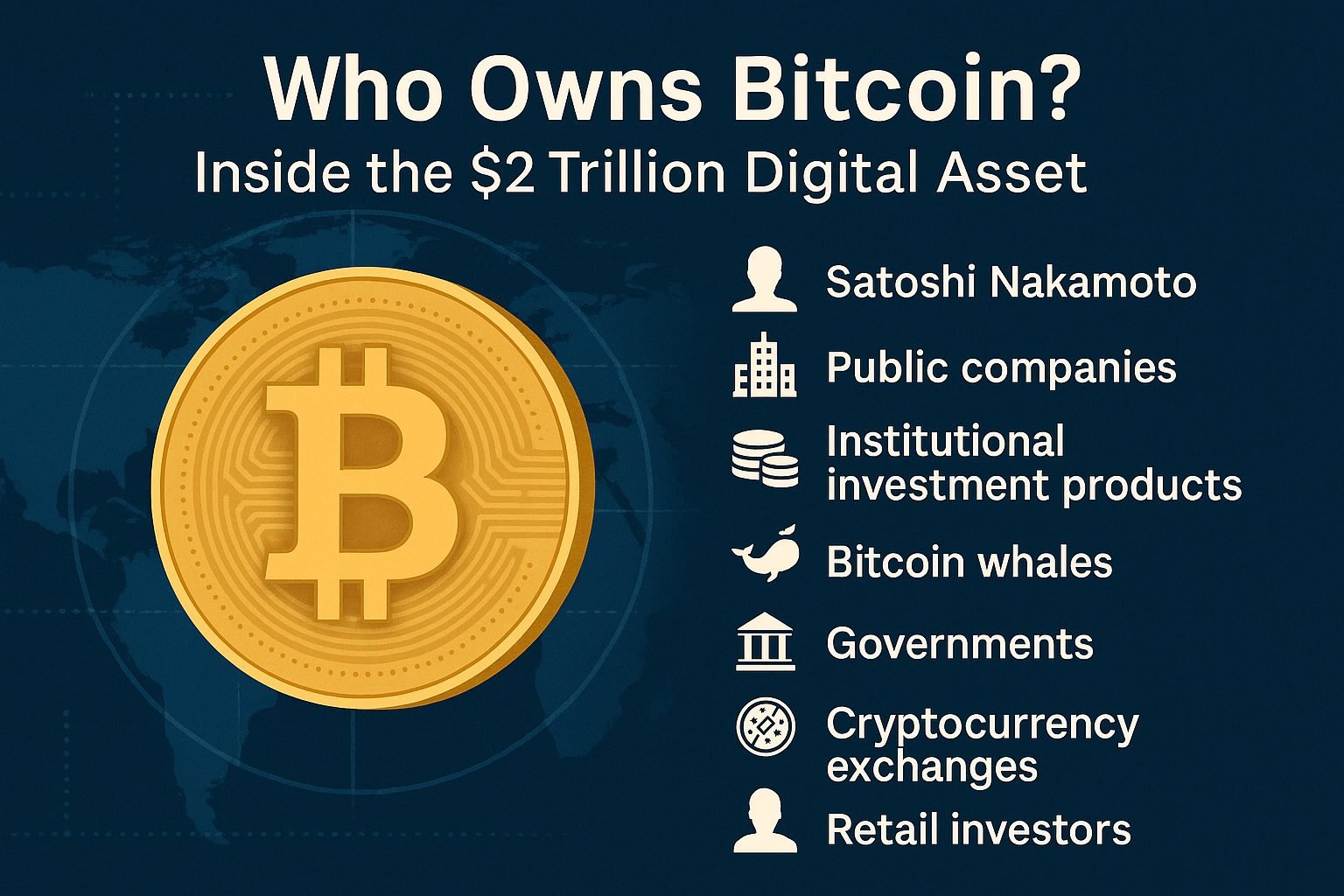The total asset value of Bitcoin is typically measured by its market capitalization. As of July 1, 2025, Bitcoin’s market cap stands at approximately $2.109 trillion.
Who holds Bitcoin’s value?
Bitcoin’s $2 trillion market capitalization is distributed across a wide and diverse range of holders. While not “invested” in the traditional sense — like capital deployed into stocks or physical assets — Bitcoin’s value reflects the collective market worth of all coins in circulation. Instead, it reflects the total value of all Bitcoins in circulation, based on market price. Here’s a breakdown of who holds this value, and, to some extent, where they are located:
Satoshi Nakamoto: The pseudonymous creator of Bitcoin is believed to hold the largest individual stash—estimated at around 1.1 million BTC. These coins have never been moved, adding to the mystique and long-term stability of this portion of the supply.
RELATED: What is Blockchain? Demystifying the ledger that could reshape the world (July 6, 2025)
Public companies: An increasing number of publicly traded firms have added Bitcoin to their balance sheets.
- MicroStrategy: Led by Michael Saylor, the company is the largest corporate holder, with over 244,800 BTC.
- Tesla: Elon Musk’s electric vehicle company also holds a significant quantity of Bitcoin.
- Other Firms: Companies such as Marathon Digital Holdings and Coinbase also maintain substantial Bitcoin reserves.
- Institutional Investment Products
The approval of spot Bitcoin Exchange-Traded Funds (ETFs) in the U.S. in early 2024 accelerated institutional adoption. Funds like BlackRock’s iShares Bitcoin Trust have rapidly accumulated large amounts of Bitcoin, enabling traditional investors to gain exposure through regulated financial products.
RELATED: What is Bitcoin? The technology, value, and the gamble behind the hype (July 5, 2025)
Bitcoin Whales” (large individual holders): These are individuals or entities who hold vast amounts of Bitcoin. Notable examples include:
- The Winklevoss Twins: Early adopters, estimated to hold approximately 70,000 BTC.
- Tim Draper: A venture capitalist known for significant Bitcoin acquisitions.
Governments: Some governments have obtained Bitcoin through legal seizures (e.g., the U.S. government’s confiscations from Silk Road and Bitfinex) or through strategic purchases (e.g., El Salvador’s national Bitcoin holdings).
Cryptocurrency exchanges: Major exchanges such as Binance and Bitfinex hold large volumes of Bitcoin, primarily as custodians for their users. While these holdings aren’t owned by the exchanges themselves, they represent a sizable share of the circulating supply.
Retail investors: Millions of individual investors around the world hold smaller amounts of Bitcoin. Though each stake may be modest, retail ownership collectively contributes a significant portion of Bitcoin’s total value.
Where the value is “invested”: Geographical distribution of holders
Although Bitcoin is a global and decentralized asset with no physical location, examining its geographical distribution offers valuable insight into adoption trends and market influence:
United States: The U.S. remains a dominant hub for Bitcoin activity, particularly after the approval of spot Bitcoin ETFs. Many of the largest corporate holders and institutional investors are based here, making the U.S. a key driver of Bitcoin’s financial mainstreaming.
Central & Southern Asia and Oceania (CSAO): Countries such as India, Indonesia, and Vietnam have demonstrated strong retail crypto adoption. The region is known for its tech-savvy population and growing interest in decentralized finance.
Sub-Saharan Africa and Latin America: Nations like Nigeria and Argentina have seen a surge in Bitcoin usage, often driven by high inflation, currency instability, and limited access to traditional banking infrastructure.
Europe: While retail adoption is more moderate compared to other regions, countries like the United Kingdom and Ukraine hold a notable presence in the crypto ecosystem, both in terms of ownership and innovation.
China: Despite strict regulatory crackdowns, China has historically played a major role in Bitcoin’s development, particularly in mining and early adoption. Its current level of holdings is difficult to assess, but the country remains a shadow influence in the global crypto narrative.
Bitcoin’s decentralized architecture means there is no central repository or jurisdiction for its value. Instead, ownership is distributed across a vast global network of individuals, companies, exchanges, and institutions. The growing involvement of institutional players and regulated financial products continues to integrate Bitcoin into traditional markets, expanding its influence and reinforcing its value on the world stage.










